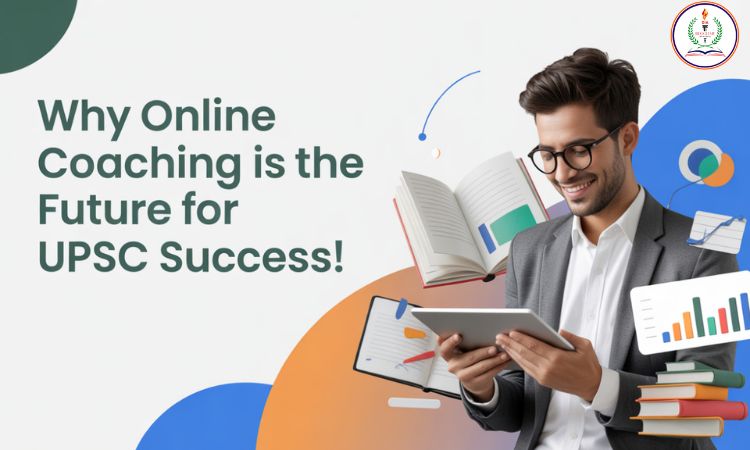The Union Public Service Commission (UPSC) civil services exam is one of India’s toughest and most competitive tests. Every year, lakhs of aspirants start months or years of preparation, often moving to coaching hubs like Delhi or Kota to join reputed institutions. However, high living costs and busy schedules make this difficult for many. Now, more students are finding that online classes offer the flexibility and quality they need. In fact, a growing number of candidates are looking for the best online coaching for UPSC as their first choice for preparation, leveraging technology to study smarter and more efficiently.
Traditional classroom institutes used to dominate UPSC prep, but recent trends show a clear shift. The COVID-19 pandemic accelerated this change: many established academies quickly adapted to the digital age, reaching thousands of students remotely. For example, reports from Kota (a major coaching center) indicate that in 2021 over half of students were taking classes online from home. This suggests that even after campuses reopened, online learning remained a durable preference. Industry data backs up this transition: a Google-KPMG report forecasts India’s digital coaching market will hit $2 billion by 2025, driven by demand for convenient, flexible learning. In short, UPSC aspirants nationwide are embracing virtual classrooms instead of relocation.
Key Advantages of Online UPSC Coaching
- Flexibility and Convenience: Online coaching lets students study anytime, anywhere. Aspirants “no longer need to relocate or adhere to rigid schedules” to learn. They can attend live lectures or watch recorded sessions from home, village, or while traveling. This is a game-changer for working professionals or those with family commitments. In fact, it even allows “working professionals and students to balance their UPSC preparation with other commitments”. This flexibility makes it easy to revisit tough topics by replaying videos, which simply isn’t possible in a one-time live class.
- Access to Quality Resources and Faculty: Online platforms compile a wealth of study materials in one place. Students get video lectures from experienced teachers, up-to-date e-books, notes, and interactive quizzes – all at the click of a button. High-quality courses cover the entire UPSC syllabus and often include features like live Q&A and doubt-clearing sessions. Many institutions now allow aspirants to attend classes taught by top educators who might be in a different city or even country. This means a student in a small town can learn from Delhi-based UPSC experts in real time.
- Affordability and Cost Savings: Traditional coaching is expensive: tuition fees plus living expenses in metro cities can add up. Online coaching dramatically cuts costs. There’s no need for costly travel or hostel fees. Platforms typically offer tiered pricing and sometimes even free introductory content. Sleepy Classes notes that because of reduced overheads, online courses can be “more budget-friendly” while still delivering quality education. In practice, many students find that online IAS courses cost a fraction of equivalent offline programs, making elite preparation accessible to more aspirants.
- Personalized Learning and Tracking: Online coaching often comes with smart technology. Learning Management Systems (LMS) can track a student’s progress, highlight weak areas, and suggest personalized study plans. For example, platforms can quiz you on your weak subjects and provide instant feedback or analytics. This tailored approach is hard to achieve in a large classroom. According to educators, an LMS ensures “the entire syllabus is covered” in an organized way and “every test has comprehensive analytics”. In short, digital tools help aspirants target their weak points and measure improvement over time, which can accelerate learning.
- Community and Interaction: Online learning can actually be more interactive than sitting in a packed lecture hall. Many UPSC coaching websites feature live classes with polls, Q&A, and virtual discussion groups. There are active forums and chat groups where aspirants can collaborate, share notes, and keep each other motivated. Sleepy Classes, for instance, highlights how an “active online community” lets students discuss strategies and help solve doubts together. This sense of community combats isolation, keeping aspirants engaged over the long preparation period.
- Access Anytime to Lectures and Tests: Most online coaching platforms record every live lecture and upload them for later viewing. This means missing a class isn’t disastrous – you can watch it later. Additionally, they offer unlimited practice tests (prelims and mains) and mock interviews. An LMS can automatically grade prelim tests and even provide model answers for mains. Consistent practice and revision become much easier when all materials are just a click away.
These combined benefits – flexibility, lower cost, rich resources, and personalization – explain why students increasingly prefer online UPSC courses. Learners who once spent months in hostel rooms are now studying from home or cafes, saving time and stress.
Industry Trends and Aspirant Success
The shift isn’t just theoretical. Top performers are embracing online prep too. In a recent interview, Kanika Anabh – who topped the Indian Forest Service (IFS) exam (a UPSC exam) – explained that she relied on digital study resources instead of classroom coaching. She said aspirants “don’t need to shift to Delhi or spend on expensive coaching” to succeed; instead, they should use the “vast online resources available today”. Her message underscores that online tools can substitute expensive city coaching when used consistently.
Similarly, large coaching centers have seen strong online demand. For example, after rapidly switching online in 2020, Kota’s institutes report “no dip” in enrollments – but now more than half of their students take classes from home. In other words, even with physical campuses open, many learners stick with the digital option. This mirrors a nationwide trend: the traditional coaching culture has simply expanded into the virtual space. According to one report, India’s tutoring industry is growing into the “digital world” – after two years of pandemic, it’s “bigger than ever”.
Market data also highlights the boom. As mentioned, Google and KPMG project India’s online coaching market to reach $2 billion by 2025. Competitive exams are a major driver: India’s UPSC, engineering, and medical aspirants are flocking to online courses for targeted preparation. Educators note that online programs are now a necessary tool for aspirants, not just a novelty, because they offer “convenient, cost-effective, and often more engaging” learning.
Deoghar IAS Academy’s Online Offerings
Recognizing this shift, new coaching institutes are built around digital learning. For example, Deoghar IAS Academy has launched comprehensive online IAS courses to reach students nationwide. They combine live interactive lectures, recorded classes, and one-on-one doubt-clearing sessions. Such programs often include mentorship and personalized feedback, mirroring the advantages listed above. By leveraging technology, institutions like Deoghar IAS Academy ensure that aspirants from small towns receive the same guidance as those in big cities. These modern UPSC courses are specifically designed to be user-friendly and adaptive, embodying exactly why many call them the best online coaching for UPSC today.
Institutes emphasize their track record too: online academies can share success stories of students who cleared the UPSC after learning from home. Deoghar IAS Academy, for instance, highlights achievers who balanced jobs or remote locations with their preparation. This shows that with the right platform, online study can rival traditional coaching outcomes.
Conclusion
In summary, online coaching has become the first choice for many UPSC aspirants because it offers flexible schedules, expert faculty, rich digital resources, and cost savings. From pandemic-born necessity to a long-term preference, virtual classes have proved highly effective. Top candidates like Kanika Anabh and countless others testify to the power of online learning. Industry trends and data confirm it: India’s coaching culture is moving online in a big way.
Aspirants who want to make the most of these advantages now look for the best UPSC online coaching providers. They compare offerings like structured courses, live tests, and mentor support. In this landscape, academies such as Deoghar IAS Academy stand out by delivering tailored online programs that many students find invaluable. Ultimately, choosing a reputable online UPSC course – one with experienced teachers and a proven track record – can give an aspirant the edge needed to succeed.
- Why Online Coaching Is the Top Choice for UPSC Aspirants
- Discover why more UPSC aspirants are choosing online coaching. Explore its flexibility, expert guidance, and success rate in modern exam preparation.
- best UPSC online coaching
Related posts:
 Engineering Design Assignment Help: Making Complex Projects Easier for Students
Engineering Design Assignment Help: Making Complex Projects Easier for Students
 Get Instant Last Minute Assignment Help in Australia by India Assignment Help
Get Instant Last Minute Assignment Help in Australia by India Assignment Help
 AI and Job Security: Discover Which Tech Roles Are Truly Safe in 2025
AI and Job Security: Discover Which Tech Roles Are Truly Safe in 2025
 Career Roadmap: Online Diploma Courses After 10th & Steps to Do MBA After 12th
Career Roadmap: Online Diploma Courses After 10th & Steps to Do MBA After 12th
 How To Integrate AI With MERN Stack?: Future of Full Stack Development
How To Integrate AI With MERN Stack?: Future of Full Stack Development
 From Beginner to Developer: How Coding Bootcamps Prepare You for Real Jobs
From Beginner to Developer: How Coding Bootcamps Prepare You for Real Jobs
 Basic knowledge of trading helps you start your journey easily
Basic knowledge of trading helps you start your journey easily
 Top-Rated Finance Assignment Help Services in the USA – Your Guide to Expert Solutions
Top-Rated Finance Assignment Help Services in the USA – Your Guide to Expert Solutions








